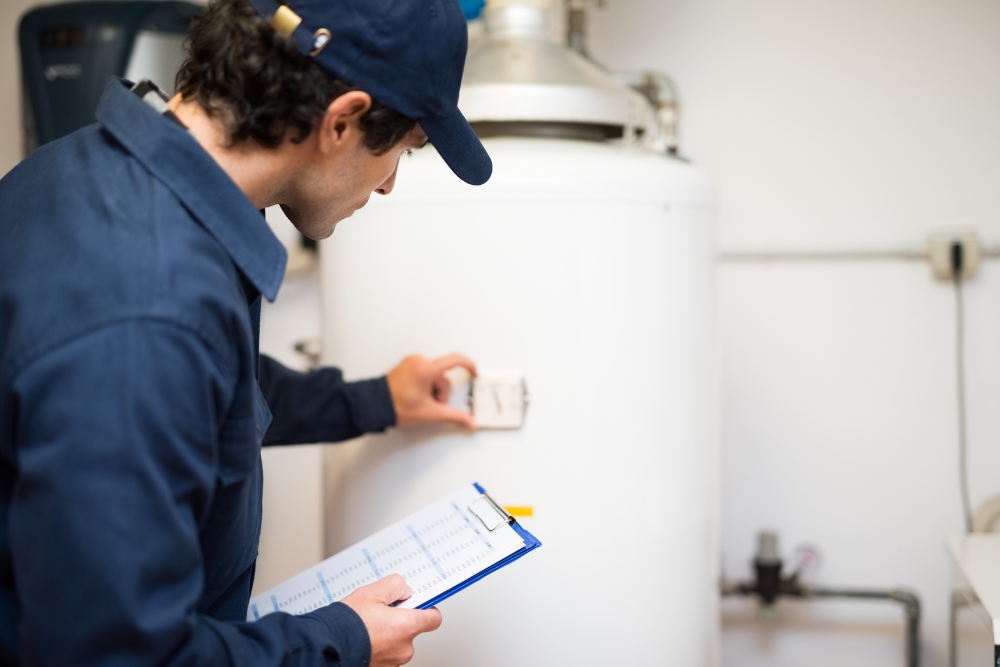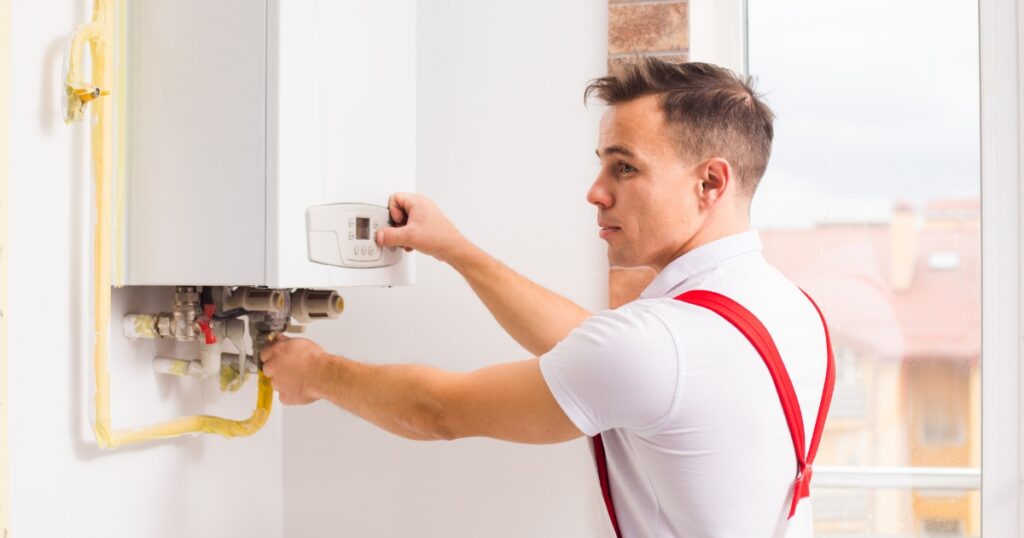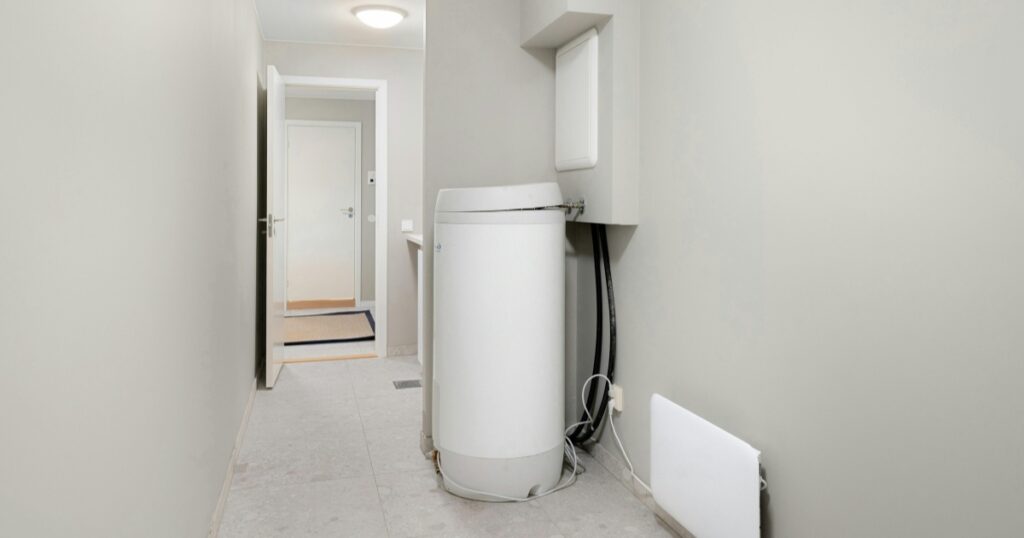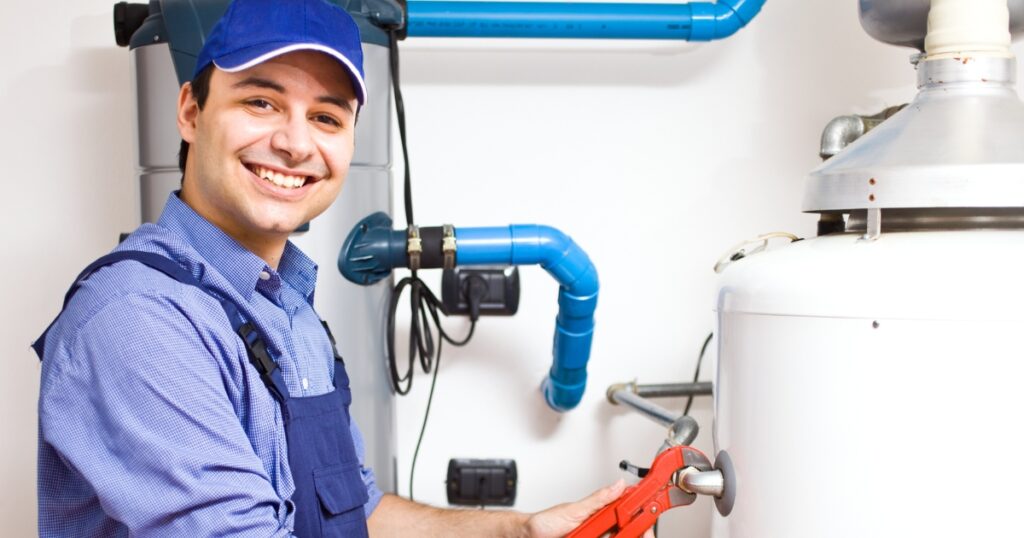We all know the drill – you open up that energy bill and you’re hit with a bit of a shock when you see just how much it’s jumped up, right? Especially when you reckon on the fact that keeping water hot for our showers and dishes is chewing through about a quarter of our household energy costs.
It’s not just you feeling the sting; we’ve been in the same boat, copping those climbing expenses fair on the chin.
But here’s some good news: after rolling up our sleeves and doing a deep dive into research, we’ve come across some dead-set practical tips for tinkering with your hot water system to make it run more efficiently.
This isn’t just tech talk – these are changes that could put dollars back in your pocket by cutting down those eye-watering bills.
So stick around folks, ’cause we’re going to show you how to give your water heater a bit of TLC so it works smarter, not harder. Trust us; there’s nothing better than watching those savings start trickling back in!
Key Takeaways
- Lowering the water temperature on your hot water heater by just 10 degrees can save you up to 5% on your total water heating costs, providing real and immediate savings.
- Regular maintenance, such as flushing the tank and insulating pipes, is crucial for improving efficiency and reducing costs. Fixing leaks in the hot water system also prevents wasted energy and water.
- Choosing a hot water system with a higher energy rating and lower flow rate can maximise efficiency while minimising both energy usage and costs.
- Consider upgrading to energy-efficient appliances or installing a heat pump or solar hot water system for long-term savings.
Understanding Hot Water Costs and Energy Efficiency
Hot water can account for a quarter of your energy costs, so it’s important to consider trimming those expenses. We’ll discuss tips for reducing hot water costs and choosing the right size hot water system.
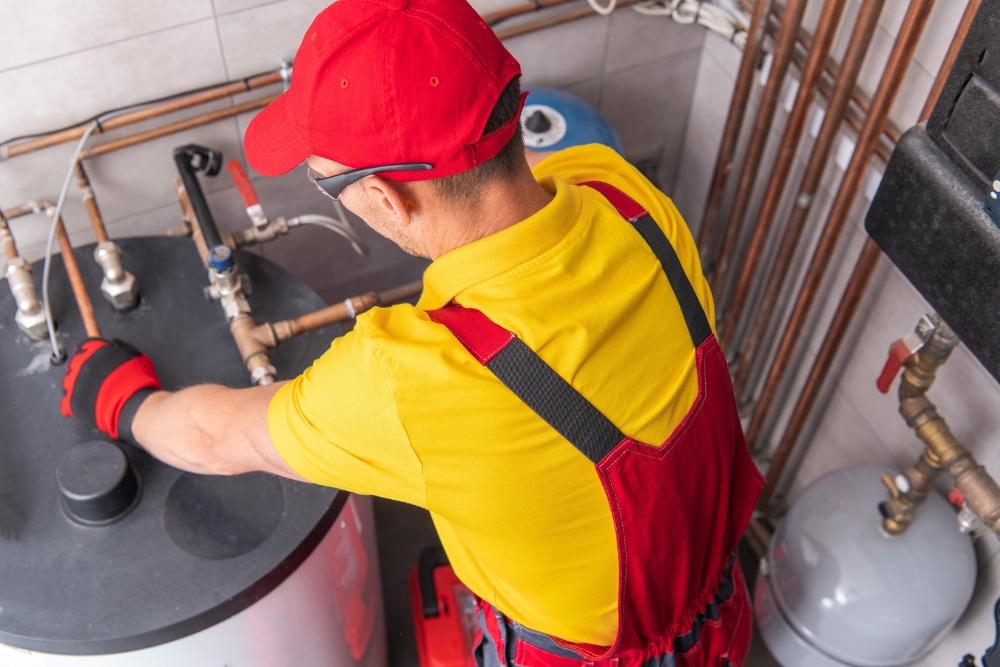
A quarter of energy costs go towards heating water
We’re all looking to save money where we can, right? Believe it or not, a whopping quarter of our home energy bills are devoured by heating water.
That’s a significant chunk of change going straight into keeping our showers warm and our dishes clean.
Consider this: lowering the temperature on your hot water system could pocket you some savings—dropping it just 10 degrees might cut those costs by up to 5%. It’s like finding cash in the couch cushions every month!
Let’s not overlook regular maintenance either; flush your water heater to banish sediment that hampers efficiency, or fix those pesky leaks to prevent throwing dollars down the drain.
With an energy-efficient hot water system humming away, we’ll be doing both our wallets and the planet a favour—slicing through those hefty utility bills while using less precious resources.
And who wouldn’t want that extra bit of breathing room in their budget for life’s other pleasures?
Tips for trimming hot water costs
Lowering the water temperature can save 3-5% on your total water heating costs. Regular maintenance improves efficiency and reduces costs. Here are some actionable tips for trimming hot water costs:
- Lower the temperature setting on your hot water heater to save energy without sacrificing comfort.
- Insulate your hot water tank and pipes to prevent heat loss, reducing the need for constant reheating.
- Repair any leaks in the hot water system to prevent wasted energy and water.
- Install low-flow fixtures to reduce the amount of hot water used, effectively lowering bills.
- Consider upgrading to energy-efficient appliances and choosing the best-suited hot water system for your needs.
How to choose the right size hot water system
Choosing the right size hot water system is crucial for maximising energy efficiency and reducing costs. Consider the number of people in your household and their hot water usage habits to determine the appropriate capacity.
Ensure that the flow rate meets your daily hot water needs without wasting excess energy or water. Additionally, look for a hot water system with a higher energy rating, as it will consume less energy while providing sufficient hot water.
Make sure to match your specific requirements with the most suitable type of hot water system to achieve optimal efficiency and cost savings.
When selecting a new hot water system, it’s essential to consider factors such as family size, usage patterns, and energy ratings to make an informed decision that maximises efficiency and reduces costs.
Comparing running costs of different hot water options
We know that as homeowners, managing expenses is crucial, and that includes our hot water systems. With each type varying in energy consumption and cost-effectiveness, it’s important to compare the running costs to make an informed decision. Let’s dive into an easy-to-understand comparison table that breaks down the different hot water options:
| Hot Water System Type | Energy Source | Approx. Annual Running Cost | Energy Efficiency |
|---|---|---|---|
| Gas Storage | Natural Gas | $650 – $850 | Good |
| Electric Storage | Electricity | $800 – $1,000 | Average |
| Solar | Solar (with Gas or Electric Boost) | $300 – $700 | Excellent |
| Heat Pump | Electricity (ambient heat transfer) | $500 – $700 | Very Good |
| Tankless | Natural Gas or Electricity | $600 – $800 | Very Good to Excellent |
As you can see, solar hot water systems can offer the most significant savings annually, while electric storage systems tend to be on the higher side of running costs. Remember, turning down the water heater can contribute to lower bills across all these options.
We’ll now explore the energy-efficient features of these hot water systems and how they can benefit our wallets and the planet.
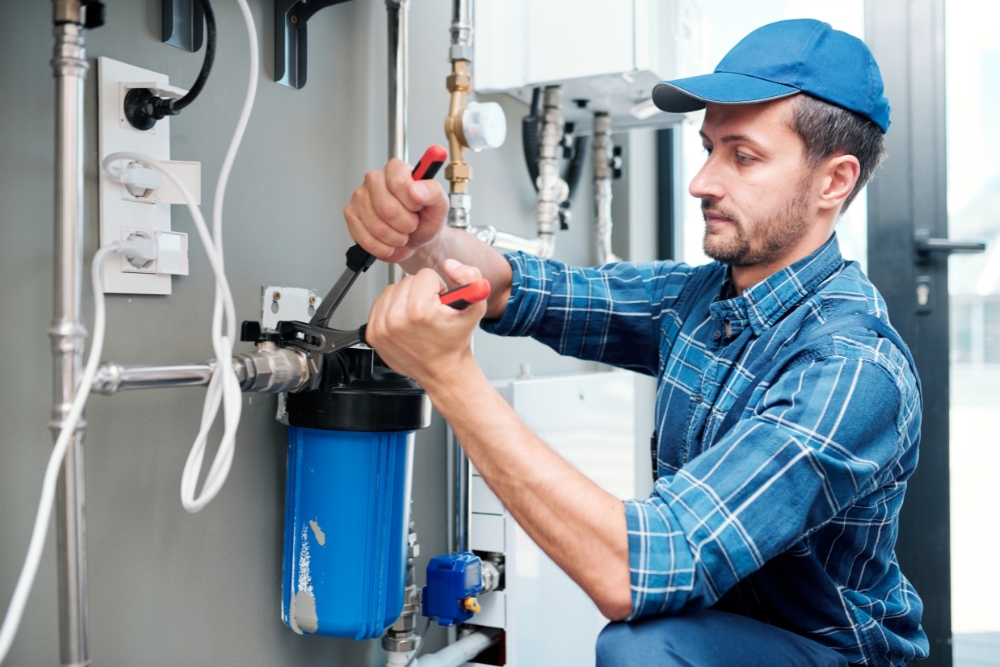
Types of Hot Water Systems
We’ll discuss the various types of hot water systems, including gas storage, electric storage, solar, heat pump, and tankless. Each system has its own advantages and considerations to keep in mind when maximising energy efficiency and reducing costs.
Gas storage
When selecting a hot water system, consider a gas storage option for cost-effective and efficient heating. Gas storage systems use natural gas to heat water, offering a continuous supply of hot water while being an economical choice.
With proper insulation and regular maintenance, these units can offer energy savings and reduce utility bills. By choosing a high-energy rating model with low flow rates, homeowners can minimise both water consumption and energy usage, contributing to overall cost reduction.
Consider installing a gas storage hot water system for consistent access to efficiently heated water at lower costs.
Electric storage
Electric storage water heaters use electricity to heat and store hot water. They are suitable for homes without access to gas. By choosing an energy-efficient electric storage water heater, you can reduce your energy bills and contribute to environmental conservation.
Regular maintenance, such as checking the temperature and pressure relief valve and flushing the tank, is essential for maximising efficiency.
Consider lowering the temperature setting on your electric storage water heater by 10 degrees to save 3-5% on your total water heating costs. Using low-flow fixtures can also help in reducing water usage while still maintaining comfort.
When shopping for an electric storage system, look for high energy ratings and lower flow rates to minimise both energy consumption and utility costs.
Solar
When considering energy-efficient water heaters, the option of solar-powered systems can significantly reduce your energy bills. By harnessing the power of sunlight to heat water, solar hot water systems offer a sustainable and cost-effective solution for homeowners.
With Bureau of Energy Efficiency certification, these systems have a high energy rating and are environmentally friendly.
Installing a solar hot water system not only reduces your carbon footprint but also decreases your reliance on traditional energy sources. By taking advantage of renewable solar energy, you can maximise energy efficiency and lower water heating costs while contributing positively to the environment.
Heat pump
Using a heat pump water heater can be an efficient way to reduce energy costs associated with heating water. Heat pump water heaters work by extracting heat from the air and transferring it into the water, making them more energy-efficient than traditional electric or gas-powered systems.
By utilising this innovative technology, homeowners can significantly decrease their hot water expenses while minimising their environmental impact. Considering a heat pump water heater is a proactive step towards maximising energy efficiency and reducing utility bills in the long run.
When considering options for a new hot water system, don’t forget to explore the potential benefits of a heat pump unit. With its ability to deliver ample hot water while using less energy, this type of system contributes to both cost savings and environmental responsibility.
Tankless
When considering hot water systems, tankless water heaters are an efficient option to maximise energy savings and reduce costs. With no need for a storage tank, tankless water heaters heat water directly as it flows through the system, providing a constant supply of hot water while using less energy.
These units are compact and can be installed closer to the point of use, minimising heat loss from long pipes and reducing the time it takes for hot water to reach the taps.
Tankless systems have higher energy ratings and lower flow rates compared to traditional storage tanks. This allows homeowners to enjoy on-demand hot water without excessive energy use or wastage.
Advantages of Energy-Efficient Hot Water Heater
Switching to an energy-efficient water heater can lead to both environmental and financial benefits. Effective maintenance tips and simple changes can help you maximise efficiency, saving you money in the long run.
Read on to learn more about how energy-efficient water heaters can benefit you.
Environmental and financial benefits
Energy-efficient water heaters offer significant environmental and financial benefits. By reducing energy consumption, these systems help lower carbon emissions, contributing to a healthier planet.
Additionally, utilising energy-efficient appliances and implementing simple changes like insulating tanks and pipes can lead to substantial savings on utility bills. Lowering the temperature setting of your hot water heater by just 10 degrees not only conserves energy but also translates into real cost savings over time.
Choosing a hot water system with a higher energy rating and lower flow rate is also key to maximising efficiency while minimising water usage. Regular maintenance, such as flushing the tank and checking the temperature relief valve, ensures optimal performance and reduces the need for costly repairs in the long run.
Effective maintenance tips
Transitioning from environmental and financial benefits to effective maintenance tips, we can follow these simple yet impactful steps to ensure optimal hot water heater performance:
- Regularly check and maintain your hot water heater to improve its efficiency. For instance, checking the temperature and pressure relief valve effectively contributes to improving water heater efficiency.
- Consider flushing the tank regularly as it can significantly improve your water heater’s efficiency.
- Ensure that you are using energy-efficient appliances and buying the best hot water system to reduce your energy bills.
- Flushing the tank regularly can also help in improving hot water heater efficiency.
- Using low-flow fixtures and fixing leaks can significantly reduce your water heating bills while contributing positively to energy efficiency.
- Lowering your water temperature by just 10 degrees can save you 3 – 5% on your total water heating costs.
- Checking the temperature and pressure relief valve is an effective maintenance tip that helps improve the overall efficiency of your hot water heater.
- Regularly inspect your hot water system for any potential issues that might lead to decreased efficiency.
- Ask a professional plumbing service for regular checks and services on your hot water system to ensure its ongoing high performance.
- Keep track of changes in utility bills post-maintenance activities, as routine upkeep positively impacts long-term cost savings on energy bills.
Simple changes to maximise efficiency
Turning down the temperature on your hot water heater can save you money without sacrificing comfort. Consider insulating your hot water tank and pipes to reduce heat loss. Installing low-flow fixtures will help conserve water while reducing energy usage. Repairing any leaks in your plumbing system can also make a significant impact on reducing water heating bills. Finally, choosing energy-efficient appliances can further contribute to lowering your overall energy costs.
Other Ways to Reduce Hot Water Costs
– Lowering the temperature of your hot water system and insulating the tank and pipes can help reduce energy consumption and lower costs. Installing low-flow fixtures, repairing leaks, and choosing energy-efficient appliances are also effective ways to save on hot water expenses.
Lowering temperature
Lower your water heater temperature by 10 degrees to save 3-5% on heating costs. Maintaining hot water at a lower temperature uses less energy without sacrificing comfort. It’s an effective way to reduce utility bills and increase energy efficiency, especially when combined with other tips like flushing the tank regularly and using low-flow fixtures.
Consider checking the pressure relief valve as part of regular maintenance for improved efficiency. Lowering the temperature can be a simple change that leads to significant savings without compromising your hot water needs.
Insulating tank and pipes
Insulating the hot water tank and pipes can further enhance energy efficiency, helping to reduce your utility bills. By wrapping an insulation blanket around your hot water tank, you can minimise heat loss and maintain hotter water temperatures for longer periods.
Additionally, insulating the hot water pipes that transport heated water throughout your home can also significantly decrease heat loss, ensuring that more warm water reaches its intended destination.
This simple yet effective step can contribute to greater overall energy savings while maintaining a consistent supply of hot water when needed.
By insulating both the hot water tank and pipes, you can retain more heat within the system, leading to less energy required for heating new or reheating cooled-down water. This not only reduces energy consumption but also supports cost-saving efforts in the long run.
Repairing leaks
After insulating the tank and pipes, another important step in reducing hot water costs is repairing leaks. Leaks can lead to significant energy wastage and higher bills. Identifying and fixing any leaks in your hot water system or plumbing fixtures can result in noticeable savings over time.
Even small drips from faucets or valves add up, wasting both water and the energy used to heat it. By promptly addressing leaks, you can enhance the efficiency of your hot water system while lowering your utility bill.
Regularly inspecting all plumbing fixtures for leaks is an effective way to stay on top of potential issues before they become costly problems. Additionally, fixing leaking taps or pipes not only conserves water but also reduces the load on your hot water heater, ultimately leading to lower energy consumption and decreased costs.
Installing low-flow fixtures
Consider installing low-flow fixtures to reduce hot water usage and save on energy costs. These fixtures, such as aerated faucets and low-flow showerheads, can significantly decrease the amount of hot water used without sacrificing comfort.
By using less hot water, homeowners can lower their energy bills while still enjoying a satisfying shower or tap experience.
Opting for low-flow fixtures aligns with our goal of reducing water heating costs and enhancing energy efficiency at home. With this simple upgrade, we can make an impactful contribution towards conserving both energy and water resources while also saving money in the long run.
Choosing energy-efficient appliances
When selecting energy-efficient appliances, it’s important to consider the water heater’s energy rating. Opt for a model with a high energy efficiency rating to reduce both energy consumption and water heating costs.
Additionally, look for appliances with low flow rates as they use less water and power, further contributing to cost savings.
Replacing outdated or inefficient hot water systems with newer energy-efficient models can significantly lower your utility bills. Keep in mind that using low-flow fixtures and repairing leaks also contribute to reducing water heating costs.
Maximise the Energy Efficiency of Your Home
Maximising energy efficiency and reducing hot water costs is crucial for every homeowner. Lowering the water heater temperature by 10 degrees can save you money without compromising comfort.
Regular maintenance, such as flushing the tank and checking for leaks, can significantly improve your hot water system’s efficiency. By choosing energy-efficient appliances and low-flow fixtures, you can further minimise both energy usage and costs.
Consider installing a heat pump water heater to achieve maximum energy efficiency and enjoy long-term savings.

